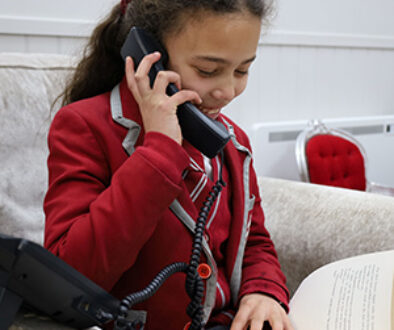A Reflection for The Epiphany
Modern Day Migrants and Magi. Before Christmas I attended a screening of Sea Sorrow in Cambridge, a film directed by Oscar-winning actress Vanessa Redgrave, which highlights refugees’ experiences in Europe. In the film, Vanessa shares stories from refugees who have managed to make a life in European countries – from pre-World War II through to this decade – and also from refugees who have not yet reached their destination, and whose plight we now regularly see in the news.
As well as recounting individuals’ stories, the film unearths newspaper clippings and draws parallels between attitudes towards refugees in Britain in the 1930s and attitudes held in Britain in the modern day. An essential part of the film’s message revolves around the importance of the Universal Declaration of Human Rights, which Vanessa remembers hearing about for the first time in 1948, and which she believed would ensure nothing like the devastation of World War II would be able to happen again. She explained the importance too of subsequent advancements, such as the United Nations Convention on the Rights of the Child (UNCRC), which came into UK law in 1992 and is the most widely-ratified international human rights treaty in history.
Vanessa is clearly angered by what she sees as a failure of governments across Europe to live up to these achievements, these noble declarations of intent, by ignoring calls and delaying actions to accept more refugees – especially children, who have a legal right under international protection law. The film is one that works very well, and those present at the screening seemed to find the historical parallels powerful.
Over the Christmas break I’m sure many people drew comparisons themselves, or saw other links via memes on social media perhaps, between Jesus’ family’s situation (as refugees from persecution), with the plight of refugees in this and the last centuries. Leaving their country, their home, and their loved ones, they journey to live in a different country where they are unable to speak the language, with few or no employment prospects, taking with them only what they stood up in and what they had taken for a few days away.
After the screening of Sea Sorrow the audience was invited to ask questions of a panel which included Lewis Herbert, Leader of Cambridge City Council, Eddie Stadnik, CEO of Cambridge Ethnic Community Forum, Liesbeth Ten Ham, regional representative of Amnesty International UK, Andrej Mahecic from UNHCR, Lord Alf Dubs and Vanessa Redgrave. Local Cambridge readers will be unsurprised to hear the overwhelming message from members of the audience that came through was that people are eager to play their part in any way they can to help refugees who have fled countries like Syria or Afghanistan. Kevin Jones, who organised the Cambridge event, helpfully created a list of local organisations supporting refugees for interested individuals – please do see this list here.
One audience member, who has first-hand experience of supporting refugees locally, explained that in addition to the more widely mentioned methods of supporting refugees (from visiting refugee camps to deliver aid or supplies to donating money to organisations which do the same) there are many other ways to help. Families without a good grasp of English can benefit enormously from assistance in learning the language – whether through lessons, by having someone to chat with, or receiving assistance in doing what we consider to be simple transactions such as filling out forms or calling service providers. It could be that someone offering a friendly welcome to a neighbourhood, or offering to show parents to the local shop, bank or school, might make a world of difference in helping a family to adjust better to new surroundings.
Today, Friday 6 January, is the Christian feast of Epiphany, which commemorates the journey of the Magi (or three kings, or three wise men) from their country in the East to Bethlehem, where they found in a stable the baby Jesus with his parents. Again, we can draw a parallel between the Christmas story and the modern day. The Magi were Gentiles, not Jews like Jesus’ people, nor members of a religion anything like Judaism, but in a way similar to many of us, they were searching for meaning and truth in their lives.
They represented people of all races and cultures, all religions and non-religious people, as they searched. They were probably astrologers: seeing a new star appearing, they believed that something very significant had happened (the Jewish Messiah had been born), and so they travelled on what would have been a long and difficult journey, into unknown lands, following the star all the way. Finding Jesus in Bethlehem, they recognised that, in Jesus, they had found what they sought, and they gave him gifts; gold, frankincense and myrrh.
Like the Magi, we are all seeking that which gives meaning and truth to our lives; considering what is important to us. What will bring happiness and fulfilment, to us and to other people? As part of the whole school assembly yesterday we reflected on what we can learn from the Magi. The Magi brought gifts to Jesus – so we reflected on the sort of gifts each member of the community has to give to others. In the same way as we can support refugees who arrive in our city, we can support each other within our school community too through companionship, by providing a listening ear or a place beside us in class or at lunch.
One particularly poignant point that Vanessa Redgrave made during the post-screening Q&A was on her decision to, as she put it, ‘preach to the converted’ by showing the film in a relatively ‘converted’ city like Cambridge. She said: “Our humanity needs to be encouraged in the very bleakest of our individual or collective times, and this is what the arts do. During World War II the War Office opened museums, galleries and theatres at lunch times, and put on exhibitions, to raise morale. People’s resistance needed strengthening.”
This remains true. After what was for many an unusually difficult year, whether as observers of political developments (even those backing the winning campaigns will undoubtedly have endured some testing times with family and friends on the other side of the debate), crises including mass migration on the one hand and what seems to be an increase in terrorist atrocities on the other, or more personal tragedies, let’s start 2017 committed to cherishing humanity. Like the Magi, our community’s resistance is strengthened when we use our personal gifts to bring happiness and fulfilment, meaning and truth, to our lives and to others.
Charlotte Avery, Headmistress, St. Mary’s Cambridge



